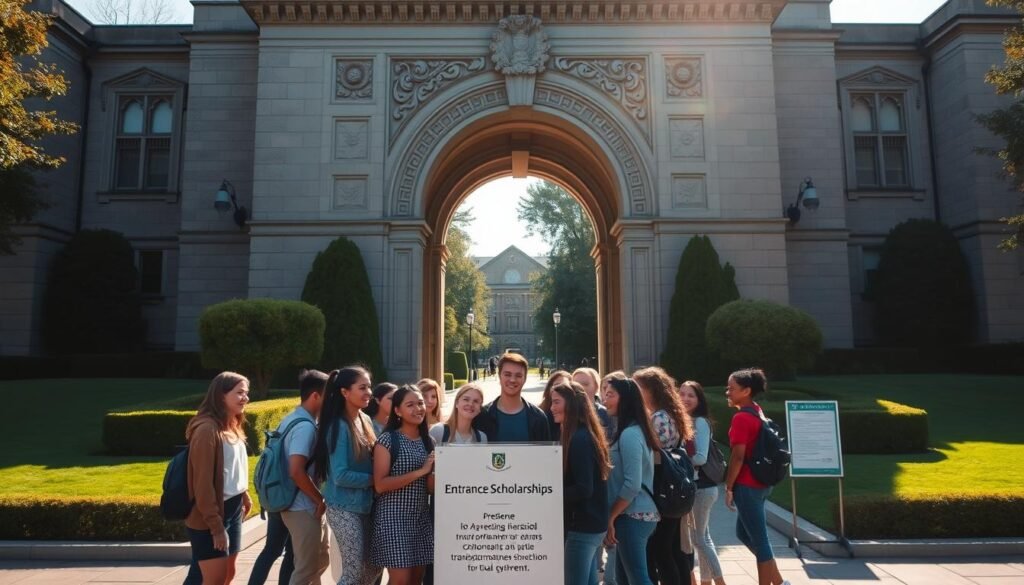
Apply for merit-based international scholarships Canada today

You’ve just found a page that makes applying less scary. Imagine opening your email to see an offer that covers years of study. That happened to Maya, a high school grad who planned carefully and won a major award that cut her costs and eased her move to a top university.
Your application can unlock automatic entry awards, like those at UBC, or high-value competitive funding such as York’s President’s prize. The right plan helps you target both types with confidence for the coming academic year.
You’ll learn which national programs fit your path, how offers affect admission and budgeting, and what steps secure funding. By the end of this page, you’ll know where to focus your effort and how to make your profile stand out to reviewers around the world.
Learn how to find, apply for, and win top scholarships for 2025–2026 across the US, UK, Canada, and Australia.
Explore Scholarships Guide →- Start strong: scholarships, awards and bursaries that help you study in Canada
- merit-based international scholarships Canada: what it means for you
- UBC merit-based entrance scholarships for international students
- UBC International Scholars Program and Vantage One awards
- York University prestigious options for international entrance scholarship recipients
- National and federal research awards that recognise excellence
- Eligibility essentials: how admissions, programs and study permits affect your award
- How to apply: admissions-first approach, timelines and evaluation
- Plan your funding: tuition, fees and years of study
- Take the next step toward your award-winning academic year
Start strong: scholarships, awards and bursaries that help you study in Canada
First, understand the three funding buckets you can tap: campus entrance awards, competitive national grants, and targeted bursaries that cut upfront costs.
Campus awards include examples like UBC’s IMES (roughly $10,000–$20,000 per year, renewable) and the OIS one-time award ($10,000–$25,000). Some campuses also apply credits automatically, such as the UBC Okanagan International Welcome Award ($5,000 tuition credit for eligible first-choice students).

You’ll see how bursaries bridge gaps in year one and beyond, and how some programs are renewable while others give a one-time boost. Read the fine print on amounts, renewability and conditions for each award.
Plan to combine institutional funding and external grants so you don’t leave money on the table. Start early: some entrance awards require only your admission, while others need a separate form and strict deadlines.
- Mix university awards with federal grants like Canada Graduate Scholarships, SSHRC and NSERC for research-focused students.
- Use targeted bursaries to lower living costs and build a multi-year budget that supports your undergraduate or graduate program.
- Look up official listings and tools such as the cross-Canada Indigenous Bursaries Search Tool to expand options quickly.
For a practical starting point and links to specific entrance offers, see this guide on applying for top entrance awards.
merit-based international scholarships Canada: what it means for you
Knowing what selection panels value gives you a practical edge when you prepare your materials.
Why these awards matter: For an international student, awards signal that you can succeed academically and contribute to campus life. Committees look for consistent academic excellence, leadership, and lasting community impact.

Why awards matter for students
These funds reduce costs and strengthen your profile for admissions and future opportunities. A clear record of strong grades and meaningful roles shows reviewers you will thrive in a new setting.
Who typically qualifies
Common eligibility themes include holding a valid study permit, entering directly from secondary school in many campus awards, and meeting nomination rules to avoid overlap with other programs.
- Academic excellence is measured by consistent marks and course rigor.
- Leadership and involvement span clubs, volunteering, research, arts, and athletics.
- Selection panels value sustained impact, initiative, and strong references.
- Applying within early admissions windows can affect timing of offers but not selection standards.
Check specific rules UBC’s IMES and OIS, for example, require new-to-UBC status, a study permit, and no nomination conflicts. For a compact list of options and next steps, see entry awards and guidance.
UBC merit-based entrance scholarships for international students
A handful of UBC entrance scholarships give new students tangible support know which ones you’ll automatically be considered for and when decisions arrive.

International Major Entrance Scholarship (IMES)
IMES awards $10,000–$20,000 per year for 2025/2026 and is renewable for up to four years. You must be new to UBC directly from school and hold a Canadian study permit.
Outstanding International Student Award (OIS)
The one-time OIS ranges from $10,000–$25,000. It recognises strong academics and extracurricular impact for new entrants from school or post‑secondary.
How UBC evaluates offers after admission
You’ll be automatically considered for IMES and OIS once UBC issues your admission offer. Decisions come between mid‑March and the end of April, before the May 1 acceptance deadline.
Okanagan welcome credit & financial planning
The UBC Okanagan International Welcome Award is automatically applied as a $5,000 tuition credit in your first year (50% each term). Remember, these awards don’t cover full tuition fees—use UBC’s cost calculator to build a multi‑year plan.
| Award | Value (2025/2026) | Renewable | Key eligibility |
|---|---|---|---|
| IMES | $10,000–$20,000 per year | Up to 4 years | New-to-UBC from school; study permit |
| OIS | $10,000–$25,000 one-time | No | New entrant from school or post‑secondary; study permit |
| Okanagan Welcome Award | $5,000 tuition credit | One year (first year) | UBC Okanagan first-choice degree; enrolment |
UBC International Scholars Program and Vantage One awards
UBC offers a scholars pathway that combines financial awards with mentoring, academic planning and a campus network that helps you grow.
International Scholars bring high-achieving undergraduates who show leadership and a commitment to social change. The program pairs need-and-merit funding with dedicated advising and a university-wide support network to guide your course choices and extra-curricular plans.
Vantage One: a first-year bridge
Vantage One helps academically strong learners strengthen English while preparing for direct admission. Awards tied to the pathway include a Vantage One Entrance Award, a Vantage One Excellence Award and an IMES option for Vantage One students.
Learning and career-ready experiences
Take co-ops, undergraduate research projects, clubs and study abroad to boost your CV and classroom learning. Advisors in the scholars community help you map these options across your years at a top global university.
- Check whether nominations overlap some awards cannot be combined.
- Review timelines and criteria early so you prepare materials in advance.
- Learn more about the UBC International Scholars Program and decide which path fits your goals.
York University prestigious options for international entrance scholarship recipients
If you aim for a flagship award and steady campus housing, York’s options deserve early attention.
President’s International Scholarship of Excellence is a flagship award worth $180,000 total ($45,000 x 4 years). It targets high school applicants who show top grades, leadership and volunteer impact.
Key facts:
- Application deadline: February 18, 2025.
- Value: $45,000 per year for four years; cannot be combined with other entrance scholarships.
- Recipients receive the higher-value offer when awards overlap.
York also guarantees four years of on-campus housing for direct-entry students starting Fall 2025, Winter 2026 or Fall 2026. That housing continuity reduces tuition and living uncertainty and helps you focus on studies and campus life.
After you accept an offer, coordinate your housing timeline with admissions and financial services. Prepare a short, evidence-rich application that highlights academic results, leadership examples and community service to match the award’s criteria.
National and federal research awards that recognise excellence
National awards can fund whole years of study and raise your research profile. These programs target strong academic records, clear project plans, and leadership potential.
Vanier Canada Graduate Scholarships
Vanier supports doctoral candidates for academic excellence and research potential. Recipients show leadership and a record of high-impact outputs.
Banting Postdoctoral Fellowships
Banting brings top postdocs into Canadian labs to drive economic, social and research growth. Selection focuses on excellence, impact and team fit.
Canada Graduate Scholarships
The Canada Graduate Scholarships (Master’s and SSHRC doctoral streams) back research across health, natural sciences, engineering, social sciences and humanities.
- Map national pathways: Vanier for doctoral study and Banting for postdocs.
- Explore NSERC, the International Scholarships Program and the Indigenous Bursaries Search Tool for extra support.
- Line up referees early and tailor research statements to national priorities.
"Winning a national award reshapes your funding picture and opens doors to larger grants."
Use these awards alongside campus funding to build a multi-year plan you and canadian students or international students can rely on.
Eligibility essentials: how admissions, programs and study permits affect your award
Clear eligibility checks save time and stop last‑minute surprises. Start by confirming which awards you’ll automatically be considered for once an offer lands. Then note which prizes need separate forms or nominations.
“Automatically considered” vs separate applications
At UBC, for example, you'll automatically be considered for IMES and OIS after an admission offer. Decisions typically arrive mid‑March to the end of April, so plan your response window.
Study permit, direct entry and program choice
Eligibility often depends on study permit status and whether you enter directly from secondary school. IMES requires new‑to‑UBC status from school plus a study permit; OIS accepts new entrants from school or post‑secondary.
UBC Okanagan applies a $5,000 welcome credit automatically if you list that campus first and are students enrolled full‑time with minimum credits. Transfer students may not qualify for some entrance awards, so confirm rules early.
- Prepare documentation: proof of status, transcripts and program choices.
- Watch nomination rules to avoid overlaps that make you ineligible.
- Align admissions timing with award windows and check deadlines.
For a focused starting point, see apply for top entrance awards and match your admissions plan to the awards you want.
How to apply: admissions-first approach, timelines and evaluation
An admissions-first plan keeps your application front and centre. Submit your university application by the admissions deadline so you become eligible for most entrance awards and have a clear path to receive an offer.
Submit your university application by the admissions deadline to unlock entrance scholarships
Apply before the stated deadline and your file moves into consideration for entrance awards that automatically follow an admission offer. At many institutions, scholarship review starts only after you are admitted.
Scholarship timelines: offers typically mid-March to end of April; most admission deadlines around May 1
Admission offers can roll out from January. Merit award decisions usually land between mid‑March and the end of April.
You often get your scholarship notification before the May 1 acceptance deadline, so you can decide with full information.
Transfer students and credits: entrance scholarship and undergraduate programs considerations
If you are a transfer student, check how prior credits affect eligibility for entrance awards and undergraduate programs. Some awards exclude transfers or require direct entry from high school.
Keep documents current: updated grades, transcripts and referee notes should be sent promptly so your application and scholarship review are not delayed.
Quick checklist to strengthen both admission and award evaluation:
- Complete your application and select your program before the deadline.
- Upload transcripts, activity highlights and referee details.
- Notify admissions of updated marks and submit any separate award forms on time.
For step-by-step application timelines and official guidance, see general application guidance.
Plan your funding: tuition, fees and years of study
Build a year-by-year funding map to track fees, credits and research income. Start with first-year numbers and extend them across the years you expect to study.
Use a university cost calculator to estimate first-year tuition, books, housing, meals and transport. UBC’s tool helps you see how OIS and IMES reduce costs but usually don’t cover full tuition.
Remember the UBC Okanagan International Welcome Award is applied as a $5,000 tuition credit split between Term 1 and Term 2 when you meet the minimum credit load. Plan your course sequence so you keep that credit.
Create a multi-year budget: awards, tuition fees, living costs and research opportunities
- Combine expected awards with projected tuition fees and living costs, leaving a buffer for fees that rise each year.
- Forecast currency swings, travel and health insurance with academic fees to avoid surprises.
- Include possible income from co-op jobs or paid research, and check study-permit work rules before you plan hours.
| Item | First year estimate | Annual change | Notes |
|---|---|---|---|
| Tuition | $XX,XXX | +3–5% | Use cost calculator for program-specific totals |
| Housing & meals | $X,XXX | +2–4% | On-campus or off-campus affects fees |
| Awards / credits | OIS/IMES + $5,000 credit | Varies (renewable awards adjust) | Check eligibility and credit-load rules |
Take the next step toward your award-winning academic year
Move from planning to action: submit your application early so you’ll automatically be in the running for key entrance awards and admission offers.
Shortlist top universities now. Compare entrance terms, renewal rules and important deadlines like York’s Feb. 18, 2025 date. Gather transcripts, referees and activity notes today so your file is complete when admission decisions arrive.
Watch UBC updates from mid‑March to late April for IMES and OIS notifications. Reach out to advising teams and the international scholars community for feedback that strengthens your submission.
Build a simple budget, lock in your credit‑load plan, and set calendar reminders for each milestone this year. Start your application today and position yourself among students who turn offers into a focused, funded year of study.
Looking for Scholarships in 2026?
Explore our complete collection of top scholarships for international students across the USA, UK, Canada, Australia, and Europe.






Leave a Reply